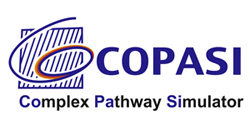COPASI - Creating and solving mathematical models of biological processes
COPASI is an open-source software application designed for creating and solving mathematical models of various biological processes. It provides a comprehensive platform for researchers to define, simulate, analyze, and visualize complex biological systems.
Key Features
- Model Definition: COPASI allows users to define models of biological processes using ordinary differential equations (ODEs), algebraic equations, or stochastic simulations.
- Simulation and Analysis: The software includes features for simulating and analyzing these models, including steady-state analysis, time-course simulation, parameter estimation, and sensitivity analysis.
- Analysis Reports: COPASI can generate comprehensive reports on the results of analyses, providing insights into the behavior of biological systems.
- Import/Export in SBML Format: Models created in COPASI can be exported in SBML (Systems Biology Markup Language) format, allowing for easy sharing and collaboration with other researchers.
Applications
COPASI is widely used in various fields of biology and medicine, including:
- Metabolic Networks: COPASI can simulate the behavior of metabolic pathways, helping researchers understand how cells respond to different environmental conditions.
- Cell-Signaling Pathways: The software can model signaling cascades that regulate cellular responses to external stimuli.
- Regulatory Networks: COPASI can be used to study gene regulatory networks and their role in controlling biological processes.
- Infectious Diseases: Researchers use COPASI to develop mathematical models of infectious diseases, helping them understand disease dynamics and develop effective treatments.
Availability
COPASI is available for download at no cost. The software is compatible with various operating systems, including Windows, macOS, and Linux.
Community Support
The COPASI community provides extensive support to users through online forums, tutorials, and documentation. Researchers can also contribute to the development of the software by submitting bug reports, feature requests, or participating in coding projects.
Website
Funding: Development and maintenance partially funded by de.NBI.


